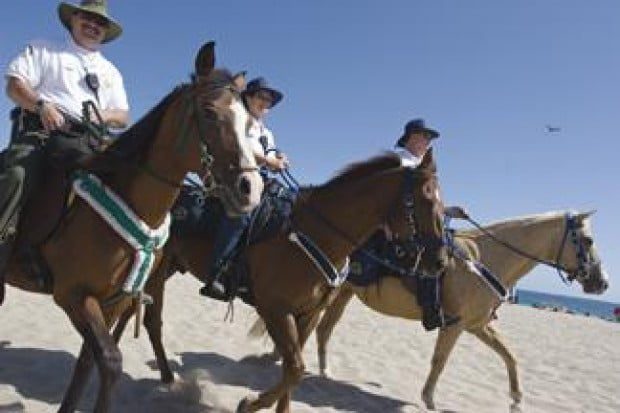
The posse, composed of volunteer reserve Sheriff’s deputies and citizens, is called out mostly for special events, like the busy Fourth of July weekend and the Chili Cook-Off.
By Jacob Margolis / Special to The Malibu Times
Slowly walking down the beach atop his horse named Raspberry, alongside two other volunteers and their horses, Sheriff Deputy Michael Selnick scans the crowd of beachgoers, looking for possible violations this past Saturday. Brought in special in advance of the busy Fourth of July weekend at Zuma Beach, the group of reserve Sheriff’s deputies and trained equestrian enthusiasts move along the sidewalk, intimidating and awing onlookers on the beach with their 1,000-pound hay-fed rides.
Selnick and the group patrolling the beach are part of the Region 1 Posse North, a section of the Malibu/Lost Hills Sheriff’s Station’s mounted division.
The group is in charge of patrolling designated areas including Westlake, Lost Hills, Hidden Hills, Malibu, Agoura, Calabasas, Chatsworth and Topanga. Brought out mainly for special events, including the annual Malibu Chili Cook-Off, the Region 1 Posse consists of about 30 people, both reserve deputies and trained civilians, but all volunteers.
“Having details like this, and getting to break off from my normal assignment is nice,” Selnick said during his Zuma Beach patrol.
Violations the posse looks for while patrolling the beaches include drinking, using illegal substances and smoking while on the beach (the Malibu City Council banned smoking on beaches three years ago). It is also illegal to use fireworks or to barbecue in beach parking lots.
When looking for a horse and a rider, the Sheriff’s Department’s requirements include riders to pass a test and go through a training course. Volunteers do not need any background in law enforcement, but they must be able to handle themselves well on their horse, and, at the very least, know about basic care and have intermediate to advanced riding skills.
Potential mounted officers must go through 40 hours of training and tackle an eventual test demonstrating the skills of the horse and the rider. The pair is put through a number of scenarios, including beach scenes, with people running around them, trucks driving by and umbrellas fluttering in the wind. The department wants to prepare the horse and rider for anything they may encounter in the field.
Sensory desensitization is highlighted in the training as well, and the exposure of the horse to such props as lights, sirens, horns and barking dogs will help to make the horse less skittish in different situations.
The difference in the various training programs for citizens versus law enforcement personnel is minimal, except the handling of weapons and tools assigned specifically for officers qualified to carry them.
The typical day for a posse member can consist of patrolling dedicated areas with their horse, cruising the beaches looking for violations, show and tell, trying to recruit, monitoring malls, or handing out information about the department. The posse also assists the Malibu Mountain Rescue Team in terrain where horses can easily traverse.
The high vantage point of patrolling on horseback increases the officers’ visibility, allowing them to see further than if they were on foot, and allows them to be seen by civilians from a greater distance.
One of the biggest problems horse mounted officers run into is when they have to arrest someone, as they have no holding area. They are forced to call for backup, and have to wait for the arrival of a squad car to take the person into custody if necessary.
While riding down the beach, Selnick, his partners and their horses seemed to amaze certain people and irk others. Not knowing what to expect, some people approached the group and pet the horses, while others watched from a distance.
“We act as more of a deterrent of crime, than crime busters,” Selnick said.
